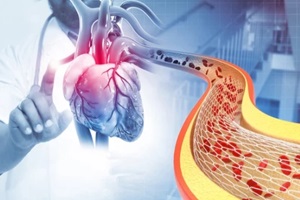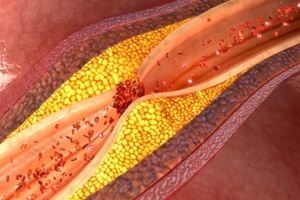 High cholesterol is one of the risks of heart disease that can be relatively easily controlled. About 100 million adults in the U.S. have high cholesterol, which means that their total cholesterol levels are over 200 mg/dL. The good news is that more medication options are available today than ever to help lower cholesterol and protect heart health.
High cholesterol is one of the risks of heart disease that can be relatively easily controlled. About 100 million adults in the U.S. have high cholesterol, which means that their total cholesterol levels are over 200 mg/dL. The good news is that more medication options are available today than ever to help lower cholesterol and protect heart health.
Read on to learn about the different drugs used to lower cholesterol and how they work.
Statins: The First Line of Treatment
Statins are the most prescribed class of cholesterol drugs. They work by blocking an enzyme required by your liver to produce cholesterol. The result is that your liver pulls more LDL cholesterol out of your blood. Statins also help remove existing LDL from your arteries.
The effectiveness of statins has been proven over decades of research and real-life use. Statins can lower LDL cholesterol levels by 30-50% while reducing inflammation within artery walls. This one-two combo significantly cuts the risks of heart attack and stroke. Some statins mildly boost HDL as an added perk, too.
Statins do carry some side effects, including muscle aches, diarrhea or constipation, liver damage, and elevated blood sugar. But these are relatively rare when taken as advised. Statins should be avoided in pregnancy and some other situations.
Common statin brands include atorvastatin (Lipitor), rosuvastatin (Crestor), and simvastatin (Zocor). Your doctor determines if one of these drugs makes sense based on your cholesterol levels and overall heart risk profile.
Bile Acid Sequestrants: Removing Cholesterol
Bile acid sequestrants take a different approach to control cholesterol. Instead of blocking production, these medications focus on removing bile acids. Your body needs bile acids to digest fats properly. Your liver pulls LDL cholesterol out of your bloodstream in order to replace bile acids lost through sequestrant treatment.
Bile acid sequestrants lower LDL cholesterol by 15-30%. They may also slightly decrease triglycerides while increasing HDL by 3-5%. Types of these drugs include cholestyramine (Prevalite), colesevelam (Welchol), and colestipol (Colestid).
Potential side effects include digestive issues such as gas, bloating, constipation, or diarrhea. Sequestrants may also hinder the absorption of some medications and vitamins. Working closely with your doctor while taking bile acid sequestrants allows proper monitoring.
Niacin to Boost Your Good Cholesterol
 Rather than directly lowering LDL, niacin raises HDL, your “good” cholesterol, by encouraging your body to manufacture apolipoprotein A1, the building block of HDL. Niacin also beneficially curbs the production of an enzyme needed to form triglycerides.
Rather than directly lowering LDL, niacin raises HDL, your “good” cholesterol, by encouraging your body to manufacture apolipoprotein A1, the building block of HDL. Niacin also beneficially curbs the production of an enzyme needed to form triglycerides.
Through these dual mechanisms, niacin supplementation has been shown to increase protective HDL by more than 30% while dropping triglycerides by up to 50%. Total cholesterol and LDL decrease modestly, too. However, large studies found niacin does not actually lower risks of heart attack and stroke when added to statins.
Due to this questionable added benefit and its potential to cause side effects such as severe flushing, liver damage, and stomach upset, niacin is no longer routinely prescribed. Dietary supplementation similarly lacks evidence.
Fibrates Fight Triglycerides
If having high triglycerides is an issue for you, fibrate drugs may help. Fibrates decrease triglyceride levels by limiting production and enhancing elimination. Many people with high triglycerides also have low HDL, which fibrates counter by upregulating HDL-creating proteins.
Through these mechanisms, fibrates lower triglycerides by up to 50% while raising HDL by 10-15%. They only marginally decrease LDL, about 5-20%. But this combination helps rebalance lipids for a healthier ratio.
Gemfibrozil (Lopid), fenofibrate (Tricor), and clofibrate (Atromid-S) make up the most widely used fibrate medications. Digestive upset can occur when taking these meds. Muscle damage is another concern requiring blood monitoring. Fibrates also interact with certain other drugs, such as blood thinners.
PCSK9 Inhibitors: A Powerful New Option
PCSK9 inhibitors represent exciting new additions to the battle against stubbornly high cholesterol. Rather than acting on cholesterol itself, these injectable monoclonal antibody drugs block PCSK9, a protein that regulates LDL receptors. More available LDL receptors then remove more LDL cholesterol from circulation.
Impressively, PCSK9 inhibitors slash LDL levels a dramatic 50-60% over and beyond maximum statin therapy. They also protect against heart attack and stroke based on gold-standard randomized studies.
 Currently, two PCSK9 inhibitors have FDA approval: evolocumab (Repatha) and alirocumab (Praluent). These breakthrough medications come at a steep cost and are limited to specific high-risk scenarios such as familial hypercholesterolemia (genetic high cholesterol). Side effects are uncommon but include cold symptoms or injection site reactions.
Currently, two PCSK9 inhibitors have FDA approval: evolocumab (Repatha) and alirocumab (Praluent). These breakthrough medications come at a steep cost and are limited to specific high-risk scenarios such as familial hypercholesterolemia (genetic high cholesterol). Side effects are uncommon but include cold symptoms or injection site reactions.
Trusted Cholesterol Medication Management in Durham, NC
Successfully controlling cholesterol relies on the patient and healthcare provider working together closely. Through ongoing care and monitoring, risky lipid levels can gradually improve. Stay committed to regular testing and follow-ups so your treatment plan has the best chance of working over the long term.
Imperial Center Family Medicine provides specialized expertise in cholesterol medication selection and management. If lifestyle measures alone don’t sufficiently lower your levels, our providers carefully consider which drug or combination makes the most sense for your situation.
We provide ongoing care to track medication effectiveness and make adjustments as needed. Contact us today at 919-873-4437 or online to learn more.
